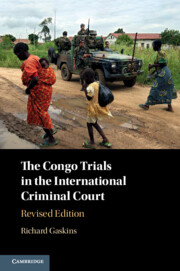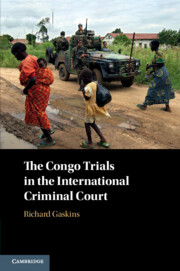4 results

The Congo Trials in the International Criminal Court
-
- Published online:
- 26 May 2022
- Print publication:
- 26 May 2022
3 - Ituri in the Web of Chaos: The Macro View
- from Back in Ituri
-
- Book:
- The Congo Trials in the International Criminal Court
- Published online:
- 26 May 2022
- Print publication:
- 26 May 2022, pp 65-92
-
- Chapter
- Export citation
3 - Ituri in the Web of Chaos: The Macro View
- from Back in Ituri
-
- Book:
- The Congo Trials in the International Criminal Court
- Published online:
- 21 September 2020
- Print publication:
- 15 October 2020, pp 65-92
-
- Chapter
- Export citation

The Congo Trials in the International Criminal Court
-
- Published online:
- 21 September 2020
- Print publication:
- 15 October 2020

